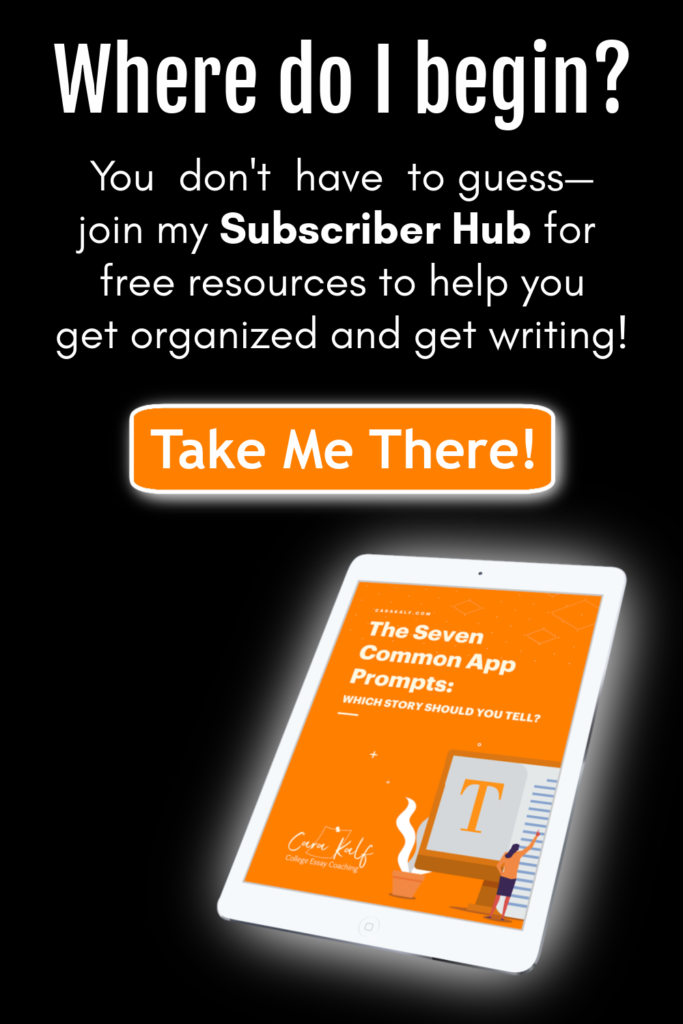5 Simple Steps to a Better College Essay
With so many prompts to choose from, stories you could tell, and organizational structures you could use, it can feel hard to know whether you’re making the right choices for your best college essay. There are so many aspects, you don’t even know where to start because it feels so hard. But it doesn’t have to feel that way! The steps you need to take are simple.
1. Work on it more.
I said SIMPLE—not EASY. If you’ve been thinking you need a long weekend of work, think again. You need dedicated time, and you need to embrace the idea that it’s going to take a lot of it. Good news: It’s August. That doesn’t mean you get to relax until October, that means you have enough time to take your time, spend time on it, and still not be stressed.
2. Choose a better story.
Again, not easy—but this is a foundational step that too many students rush, grabbing the first topic that floats to the surface of their mind and clinging to it like a board in the waves after a shipwreck. Things are not that desperate! Give yourself time and patience to consider more possibilities. Is the topic you’re writing about inspiring to you? No reader is going to be fooled by an essay that even you aren’t enthusiastic about—least of all a jaded application reader on her twentieth essay before lunch. What topic makes you light up when you talk about it? What do you choose to talk about with your friends? Is there any way that could make a good story? (This is a sincere question. The answer might be “no.” If the answer is “video games,” and you aren’t planning to study game design, the answer is “no.” But consider your options. Almost any real-world story has potential.)
3. Write more.
When I taught in the classroom, my students took a high-stakes statewide standardized writing test. A close reading of sample student work from the state—model pieces at each point value—showed clearly that the difference between a 3 and a 4 was predominantly length. While other levels showed more jumps in thought process, a 4 was really a 3 that knew how to keep going.
I don’t want you writing your college application that way. You’re not being paid by the word. But if you don’t feel constrained by the 650-word limit, your topic is not thoughtful or in-depth enough. You should feel compelled to keep telling your story. If you are looking at 400 words and feeling finished, return to step 2 and choose a better story.
4. Cross-examine every adjective and adverb.
More likely than not, you’re going to end up cutting out 3 out of every 4 adverbs you write and maybe half of the adjectives. They are rarely as important as you think they’ll be. Students are often surprised to find that amplifiers like “really” or “very” don’t make the sentence sound any more certain or determined than it would without them.
But this is an editing rule. Don’t try to write without adjectives and adverbs. For one thing, that will just confuse and distract you as you try to write what you’re thinking (which will, naturally, include those descriptive words). For another, you might need to take a page from an old English assignment and use the adverb to direct you to a more precise verb. (After you’ve written, “I ran as quickly as I could to my sister,” you can come back and correct: “I raced to my sister.”)
5. Proofread to perfection.
This is not news—but it is both simple and critical. Read your work over several times to correct any grammatical, spelling or punctuation mistakes. If you can’t do it on your own, know your resources. Who will proofread with you? (Not for you—with you. If you don’t know how to proofread your own work, what will you do when you get to college?)
Make sure to read out loud to avoid glancing over simple mistakes that your brain tends to ignore. (The brain is remarkably adept at reading past typos—it knows what you meant to say, so it keeps going.) Reading out loud forces you to focus on each word and is more likely to trip you up if there is a mistake on the page.
The “secrets” to great college essays aren’t easy—but they are simple. So start now, and take your time. A great essay is waiting!
If you’re still feeling overwhelmed by the Common App prompt choices, let me send you a free brainstorming guide:
Yes! I want the guidance that will help me brainstorm my best Common App essay.
(Photo by Rachel Moenning on Unsplash)


